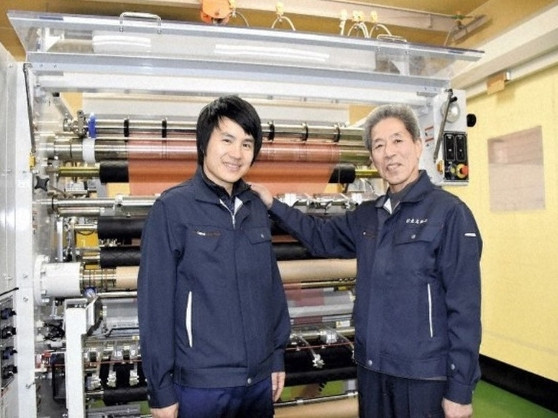Former Vietnamese intern unexpectedly becomes heir to Japanese company
President Nagao Shiko has chosen Nguyen Duc Truong from Vietnam as the successor to the Nagoya-based company.
Amid a succession crisis, a small business owner in Japan has chosen a former Vietnamese intern to take over his company in the future.
The Mainichi newspaper called the decision of Nagao Shiko company owner Yasutaka Nagao a “surprise”, “a consequence of the crisis in finding a successor”.
Succession at small, medium and micro enterprises in Japan is a major challenge for the country's economy.
President Nagao Shiko has chosen Nguyen Duc Truong from Vietnam as the successor to the Nagoya-based company.
 |
| Nguyen Duc Truong next to the owner who will be handing over the inheritance to the Japanese company. |
Nguyen Duc Truong is a company manager. He came to Japan in 2005 as a technical intern.
After training, he worked in Japan. Nguyen Duc Truong married a Japanese woman.
In 2008, he worked at Nagao Shiko company through a recruitment office.
At first, Tran Duc Truong did not make a special impression. But his ingenuity and diligence helped him gain more and more trust.
“The 34-year-old man has won the boss’s absolute trust through his work. He can repair all kinds of machines and do the entire production process himself,” Mainichi wrote.
“I was very surprised when I received an offer to take over the company from Mr. Nagao a few years ago. But most of all, I was happy and proud that he put his trust in me. I decided to protect this company,” said Tran Duc Truong.
Mr. Nagao founded the company in 1969 after graduating from university. His initial goal was to revive his late father's closed company.
In the early days, the company mainly handled orders for disposable diapers. Later, the production facility shifted to producing laminated films for car batteries or convenience stores.
Typically in Japan, companies of similar size are inherited by the boss's children. It is rare for a Japanese boss to choose a successor who is not a relative.
It must be added that Japan, with its aging population, is increasingly dependent on foreign labor. At the age of 72, he said he had been thinking about a successor since he was 60. The first person he thought of was his eldest son. However, he did not want to follow in his father's footsteps and chose another job.
After many years of thinking, he decided to choose Nguyen Duc Truong, 34, as factory manager. “I don’t want to give up, and as long as I have customers, I still have the responsibility to promote the company’s activities. I feel relieved to have found someone who shares the same vision as me to succeed me,” said Mr. Yasutaka Nagao.
Nagao Shiko, a paper processing company, employs about six people. Mr. Nagao's views on succession are considered a new trend in Japan.
Waseda University lecturer Hirokazu Hasegawa commented:
“If a leader cannot find a successor among his relatives, it is understandable that an elite employee is mentioned.”
A survey by Tokyo Shoko Research in 2016 and 2017 of 4,303 medium-sized companies and 3,984 small-sized companies showed that over 30% of companies were struggling to have a succession plan. 17.2% of small companies said the current generation was the last.

